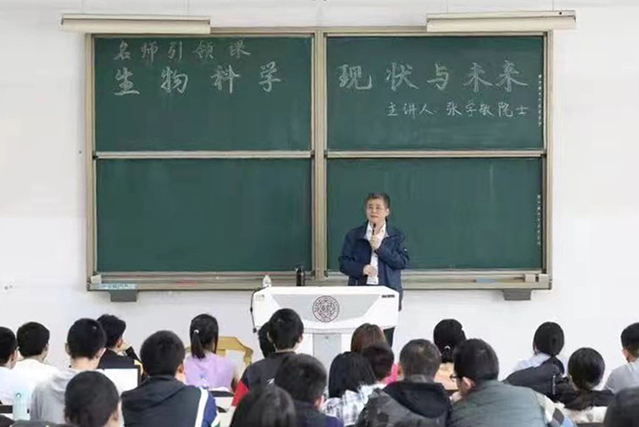“Led by Masters” General Education Course: Lectures on "International Frontiers and Challenges in Tumor Prevention and Treatment" by Academician Zhang Xuemin

On April 28, Zhang Xuemin, academician of the Chinese Academy of Sciences and director of the Medical Department of the National Natural Science Foundation of China (NSFC), presented the course International Frontiers and challenges of Tumor Prevention and treatment to more than 200 teachers and students of Nankai University. This lecture is part of the “led by masters” general education course of Nankai University, one of the series belonging to Current and Future of Biological Sciences.
In class, the academician Zhang Xuemin started with the three major problems of tumor prevention and treatment, leading teachers and students to consider the frontier challenges of tumor prevention and treatment by elaborately describing why tumors occur, how they occur, and how to intervene”. Combining his decades of basic research and clinical case studies, he referred to the development of science and technology that has brought more and more opportunities and hopes for mankind to overcome tumors, from the beginning of research on tumor prevention and treatment with cell cycle as the starting point, to the discovery of targeted drugs, and then to the current concept of immune escape. At present, through the PD1/PD-L1 antibody immune checkpoint therapy method, the body's own immune cells named T cells can actively kill cancer cells, in order to successfully eliminate some categories of tumors and reach the curative effect.
Academician Zhang Xuemin also shared with the audience the research results of his group in recent years. Among them, the discovery of the mitochondrial calcium flicker phenomenon, just like “fireworks of life”, attracted the admiration of students and teachers, and the results were published in Nature in 2019. The result was published in Nature Cell Biology in 2019. Another research result of Zhang's group, treatment of autoimmune Diseases based on DAN receptor Regulation, was also listed as one of the top ten advances in Chinese science in 2020 by the Ministry of Science and Technology of China. Zhang Xuemin said, Whether the research content is exciting or not depends on the height of the scientific question and a high-level scientific question, you need to learn to think with your head. I hope students can learn to think proactively and enhance the height of the scientific questions they ask, so that the scientific research they engage in can truly be of value and serve society.
Before the class, academician Zhang Xuemin also had a talk with the student representatives of our school. Taking the tumor research he was engaged in as an example, he told his students about the ways and methods of scientific research and encouraged them to actively engage in scientific research. He pointed out that scientific research should start with problems, and diligent thinking is the quality that college students should cultivate.
(Reported by Jinming Liu, translated by Xinyu Wen, edited by Davide Francolino and JianjingYun)









